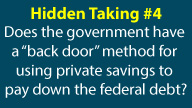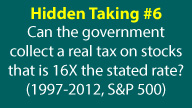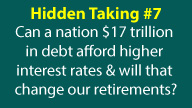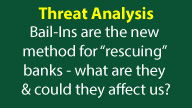The Perils Of Wielding Fragile Economies As International Weapons
by Daniel R. Amerman, CFA
When a group of nations wants to control the actions of another nation, then diplomatic posturing aside – this ability to exert involuntary control over another nation comes down to the ability to wield an appropriate sized "stick".
In past years, this stick was often military in nature, and in the well-known words of former US President Teddy Roosevelt, it should be a "big stick".
In the early 21st century and with the current crisis in the Ukraine, the decision of the Western governments has been to wield an economic stick upside the head of the Russian government, in an attempt to make them change their actions in the Ukraine.
Now in theory, if the United States, Europe and their allies had healthy, sound economies which like solid oaken clubs could easily withstand this "stick swinging", then this could potentially be a quite effective weapon over time (at least when applied to democratically controlled nations).
However, if the nations in question are economically dysfunctional and still attempting to climb out of a six-year global "Great Recession", as they remain deeply indebted and in quite financially fragile shape, then the repeated swinging of this stick with harder and harder force may not lead to the outcome that the governments think it will.
Indeed, if what you are swinging is not a club of solid oak but rather a fragile collection of glass and balsa wood rods held together by duct tape, then the harder and more often that you smash – the more likely that the outcome may be entirely different than what is desired.
Now while the situation in the Ukraine is the immediate story, the issue goes far beyond the present crisis or eastern Europe. Variations of this situation already exist in Iran, Syria, North Korea, to name some of the most current prominent examples. And it is likely to develop in new forms again and again over the decades to come, perhaps with some quite large and economically powerful nations or coalitions of nations who are behaving in a manner which the US and Europe find objectionable.
The fundamental question is that if Western nations want to attempt to force other nations to do as they are told and conform to what the Westerners believe are the norms for civilized society – but the Western nations are either unwilling or incapable of using military might, could it be they're placing their economies, financial systems and even standard of living at potentially grave risk through relying on the "weaponization" of their still weak economies as the tools for the application of force?
This analysis is strictly a non-political and non-partisan examination of the potential financial and economic implications, rather than a discussion of international geopolitics, or moral questions of right or wrong, or the very personal costs to the people of the Ukraine – important though those questions are.
We will examine these implications in three different categories:
1) The economic risks.
2) The financial stability risks.
3) A potentially game-changing fundamental transformation of global economics.
Economic Risks
The heart of the risk with current sanctions, and particularly with increasing economic sanctions, can be found in the heavily indebted nations of Europe with their aging populations and expensive social "contracts", with economies that are currently struggling to emerge from a long recession.
The Europeans, particularly the Germans, know very well indeed that in the event of increased sanctions they are the ones who are going to be paying the first level of costs.
30% of the natural gas that Europe depends on comes via Russia, and Russia also provides a substantial share of the oil and coal that Europe runs upon.
Russia is also a very important trading partner of Europe, even as many Europeans are employed in manufacturing the products that Russia needs – which it pays for with its energy dollars.
So if economic sanctions continue and get worse, Europe has two powerful recessionary forces coming into play simultaneously as it faces a shortage of energy, with energy costs being likely to skyrocket, and unemployment likely to rise even as corporate profits fall because of losing markets. Thus a continent that was hoping to emerge from recession – may very well go into a deeper recession than ever.
It's also worth noting that amidst all of the economic dysfunction particularly in southern Europe, it has been the still healthy and thriving German economy that's been helping to pull all of Europe along.
But if the German economy takes a body blow as a result of this – then who is going to step in to pull the European economy forward in real terms when it comes to real products?
Meanwhile, those who say that the United states would pay relatively little economic price are likely not considering the full implications.
The heavily indebted US government is holding together a dysfunctional economy where high unemployment rates have become increasingly a structural component of the US economy, even if they are hidden by changes in workforce participation rates.
Moreover, even while many economists and headlines continue to point out hopeful signs that we've turned the corner and things are about to get back to normal – the return of robust economic growth and full employment always seem to remain on the horizon, rather than actually taking place.
And the implications of economic warfare for the US economy are powerful when we look both at trade and we look at energy.
In terms of trade, the United States' largest trading partner is Europe. We don't live in an isolated world. If Europe goes back into a deeper recession, then that reduces US trade with Europe –which helps cut off any hopes of a quick and powerful economic recovery in the United States as well.
Indeed, Europe slipping into a deep recession would likely substantially decrease corporate profits in the United States even as it increased unemployment levels.
Now it has been fascinating how some people have jumped upon the Ukrainian crisis as an opportunity for US energy companies to make more money, while hopefully employing more people.
Hence the immediate offers and enthusiasm towards changing US law so that large amounts of US natural gas can eventually be shipped over to Europe to cover any deficiencies caused by the Russians cutting off the supply.
However, what isn't being recognized is that there are double costs here.
First and foremost, on a global basis if there is a major source of supply that is gone, then all else being equal, prices are likely to rise for energy. And because of the substitutability of energy in many situations, this may extend far beyond natural gas.
More specifically, when we open up US energy supplies to Europe and the US becomes an exporter, then all else being equal, the fact that more than twice the population will have access to US natural gas creates a basic shift of supply and demand – which could mean that the price of energy within the United States could rise for years and even decades to come.
This will be both an economic drag on production outside of the energy sector, as well as having a potentially substantial inflationary impact on the standard of living of US residents.
It could be, then, that the price of shifting Europe's natural gas source from Russia to the United States may be the average US resident paying higher utility bills for decades to come.
Financial Stability Risks
There are two distinct types of short-term risks to the financial order in the United States, Europe and around the globe that have currently been set into motion.
One of them has to do with the fundamental economies and what is holding the markets together right now.
As my long time readers know well, I have long made the case that dysfunctional economies and effectively bankrupt governments don't necessarily translate to falling markets or currency crisis or collapse.
Rather, these same very dangerous factors prompt governments to "change the rules" when it comes to laws and regulations and the very nature of the currency itself. Which is exactly what has been happening over the past six years, with the most prominent example being massive monetary creation being used to artificially suppress interest rates, even while these same low cost funds artificially boost stock market levels.
Now while governments have great powers, they are far from either omnipotent or omniscient. And fundamentally, the greater the difference between the real performance of the economy and what the government is attempting to hold together in terms of artificial markets, the greater the inherent pressure – and the more likely that any given unexpected event or random mistake could collapse the stability of the system.
There is another potentially even greater short-term financial risk here.
The way it is being often presented in the media is that essentially Russia is the errant child who must be punished by the stern adult, so as to preserve the world order. With the implication of course being that there isn't much the child can do about it, other than eventually do as they are told.
Prevalent though it is, this is a very unusual way to view international politics and political history. Let me suggest that a more apt perspective would be that what we're talking about here is a state of warfare, albeit economic warfare rather than an actual military war with soldiers and bullets.
And wars are always expensive, and always carry risk – regardless of the form the warfare takes. And they don't usually involve one side passively accepting a spanking from the parent figure – but rather two parties engaged in a no-holds barred struggle, with each attempting to do as much damage as possible to the other, and with surprise attacks being a highly desired component.
If Russia is deliberately attacked and badly wounded, economically-speaking, that doesn't necessarily mean that they roll over and surrender. Instead, as is more typically the case in warfare, they're more likely to seek ways to strike back – and strike back hard.
If there is a counter-attack, it could be energy-related. Or it could have to do with the reserve status of the US dollar, or the Euro.
Or, it could be something asymmetrical and covert (and thus deniable), like one of the many possible variants of cyberwarfare. Such as a web-based assault on the US and European financial system, designed to shut down the electronic flow of money. Or a Stuxnet-type national security grade viral assault on the vulnerable US power-grid – much like somebody did to Iran in order to destroy their centrifuges and delay their nuclear program.
Or, it could be something else altogether different.
Or, there might never be any form of counterattack after all. Indeed, the entire Ukraine crisis could certainly essentially "vanish" – at least as far as non-Ukrainians are concerned – any given day or week now.
The point here is not about attempting to predict the future with certainty, but rather to understand that a shifting of the odds has occurred, and may grow if stronger sanctions are applied.
Because long-term sanctions could weaken the European and US economies, this increases the pressure on the stabilization mechanisms, which to at least some degree raises the odds that some random, accidental event or mistake could severely damage or even bring the system down.
Long-term and painful economic attacks on another nation raises the odds that an economic counterattack may be attempted, that isn't the slightest bit accidental.
The combination of 1) increased pressure and 2) creating motivation for a non-accidental assault are multiplicative, and may sharply shift the odds of waking up one morning and finding that the world just changed in a way that could significantly impact the rest of our lives.
This situation is not confined to the present crisis in the Ukraine but rather may return time and again, so long as nations with major economic issues make the decision to attempt to control the actions of other nations through strictly economic means. Now the reason for the intervention may be highly desirable and even justifiable each time, and something that nearly every decent and civilized person in a particular culture may agree with – but that moral standing doesn't lessen the reality of the risk.
The Potential For A Far Reaching Change To The Rules Of The Game
At this stage it certainly appears that despite extraordinary verbal opposition from the United States and Europe, Russia has quite easily and rapidly annexed Crimea.
And while no one knows for sure at this point, the chances appear pretty good that Russia may also achieve "success" when it comes either to the outright annexation of parts of the Ukraine, or the federalization and neutralization of the Ukrainian government.
And it may have other places on its agenda as well.
Now while this is critically important to the world and particularly to the people involved in these nations, in the "big picture" there are potentially serious implications that extend beyond Eastern Europe.
For what this all seems to signify is that the very rules governing world order have changed. We may possibly be returning to a state similar to what we've seen for most of the 6,000 years of recorded history, in which stronger nations are able to prey on weaker nations – and there's just not much the "international community" has to say about it unless it has some sort of "big stick" to wield.
And if that works out to be true, then this necessarily leads to a radical change in the decades ahead for this purportedly globalized financial world of ours.
The next crisis may have nothing to do with either Europe or Russia but may occur in entirely different places in the world.
When power-seeking leaders come to understand that they can act with impunity as there's no longer anyone who can stop them, then we may indeed start to return to a place where people's lives are ever-more dominated by old fashioned "might makes right" politics rather than the current vision of a new globalized political and financial order – and this could also have a major impact on the financial returns from some emerging markets.
Now if we push this potentially increasing political and military instability up against an increasingly unstable economic situation, then we have a powerful clash there.
The chance of stability failing rises sharply.
And the ability of nations with dysfunctional economies that are held together by ever more aggressive interventions to wield some sort of economic "stick" against other nations grows ever smaller. Which creates a self reinforcing loop, where an ever weaker ability to resist leads to ever more blatant and outrageous actions by other nations, which can be increasingly difficult to fight with purely economic means.












